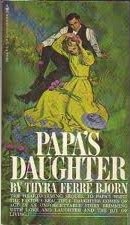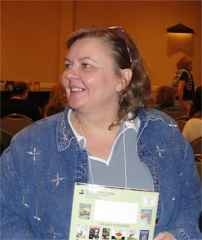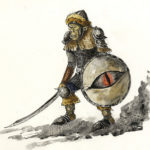How God Saved Me While I Read A Novel
How God Saved Me While I Read A Novel
By Sally Apokedak
When I was a young woman, I had a job that took me to Fairbanks, Alaska, one week a month. My work auditing small stores brought me into contact with plenty of paperback book racks, and I always picked up a few books on my first day in town, to read in the evenings during the week.
 One trip I found myself in my hotel, happily snuggled down with a bag of cookies, a jug of milk, and a novel—Papa’s Daughter written by Thyra Ferre Bjorn.
One trip I found myself in my hotel, happily snuggled down with a bag of cookies, a jug of milk, and a novel—Papa’s Daughter written by Thyra Ferre Bjorn.
It was during the reading of that book that God saved me.
The author never preached a sermon or invited her readers to ask Jesus into their hearts. None of her characters decided to accept Jesus as Savior.
Here’s the part of the story that convicted me:
A husband tells his wife not to go out because she’s eight months pregnant and the sidewalks are icy. After he leaves, the wife decides she can visit her sister and be home again before her husband gets back from work.
She slips on the ice and loses the baby.
Knowing how much her husband was looking forward to the child’s birth, the woman is terrified that he’ll hate her. But he forgives her without a word of rebuke. He rushes to her hospital bed, hugs her tightly, and weeps with her.
Here’s the gospel message in that passage:
A rebellious woman disobeys the one in authority over her, and her disobedience causes the death of his beloved first-born son. She dreads seeing the one in authority because she knows she deserves his wrath. But the good husband forgives. Instead of holding on to his love for the child, he turns away from the son and chooses to love the woman. He forgives her and restores the relationship she broke by her sin. He doesn’t yell. He doesn’t exact payment in any form. The innocent child dies, paying the consequences for the woman’s sin, and his father forgives.
But I didn’t see that gospel until many years later when I was telling a friend how I was saved. All I saw as I was reading, was the surface story and how that related to my life experience:
A women disobeyed her husband and killed the child he loved. He forgave her.
I will never forget how my own sin slammed into me as I cried with the character over her loss. For the first time, I realized that I had killed two human beings by abortion. They were children! As that character and her husband wept over the loss of the baby, I was forced to see that the babies I’d killed were real people. And they were God’s children, not mine. I didn’t create them. I didn’t own them.
I had always seen God as a party-pooper who wanted to withhold good things from me. After all, who was hurt with my drugs, sex, and rock and roll? It was all harmless fun, I figured. But that night I saw that my harmless fun was wicked, wicked stuff and that I had fallen to the point of murdering innocents, all for the sake of having my fun. All God had ever done was love me and try to protect me from my own evil impulses, and all I had ever done was treat him with contempt.
I was so sorry, and in that instant God’s love and comfort flooded over me, and I knew he forgave me as surely as the woman’s husband, in the book, had forgiven her. I was a new creature—in the blink of an eye. My life was forever changed.
I doubt that Thyra Ferre Bjorn was making a statement about abortion when she wrote her book in the 1950s. I don’t think she intended to prick the heart of a young woman, some thirty years later, who had purposefully killed two of her children via the abortionist’s table.
But God used her book to save my life. And he did that even though I didn’t understand how the author had woven the gospel into the story. My mind didn’t get the whole picture she painted, but my heart got enough of it.
A book is first published by a big New York publisher in 1958. I stumble across a copy in 1984 in a dusty little store in a far-away Alaskan town. By the time I read the book, the author has been dead nine years. Who owns the characters? Who owns the story?
The author owns the story she created, the reader owns the story she reads, and over all the Holy Spirit owns the book and the author and the reader.
Before I was born, God moved Thyra Ferre Bjorn to write a story that was perfectly fit for my needs.
Sometimes I wonder if we should worry less about what makes for Christian fiction and just write. We Christian writers have the great privilege of being yokefellows with God. I think that should free us up to write fearlessly. We can try new things. We can weave the gospel into the background instead of having it out front. We can put in Christ figures that are as flawed as David and Satan figures that are beautiful and fun to be around. We can write for friends and family without worrying about whether we’ll ever be published or not. God has given us our minds and our unique life experiences, and he has given us the skill and the desire to write our stories. We can trust him to prepare readers with ears to hear.
~~~~~~~~~~~~
Sally Apokedak, grand prize winner of the recent Novel Journey Out of the Slush Pile contest, lives with her son and daughter and old, old mother in the lovely southern city of Atlanta. She does most of her blogging at Whispers of Dawn and some of her commenting here at Speculative Faith.











































Thanks, Becky, for posting this. You added a wee bit to the bio, I see. 🙂 Thanks for tooting my horn for me. One small correction. I didn’t win the Genesis spec fiction in 2009. It was 2007.
Sometimes I wonder if we should worry less about what makes for Christian fiction and just write.
When I first starting seriously pursuing writing, I was conflicted as to how much “God” and “Christianity” I should include in my stories. At the time I saw a lot of secular writers who just caused God grief at the way they used their talent (I’ve since changed the internet atmosphere I hang out in 😉 ) and felt a tug to go overboard in the opposite direction. Through a lot of prayer I came to the conclusion you stated here. Just write. If your heart and mind are open to God’s will, He’ll use you.
Thank you, Sally, for sharing this personal story. It is a powerful testimony! And congratulations. I follow Novel Journey and thoroughly enjoyed your entry.
Sally, that was especially beautiful to me because I read that book as a teenager, several times. I don’t remember the events described in the book, but I remember that it made me feel cozy and loved and safe. It was like a hug from God.
Now I want to find the book somewhere and read it again. And put it on my keeper shelf.
What a wonderful story! And great application. Thank you.
Thanks for correcting the date on your Genesis contest win, Sally. I forgot to check with you on that. And yes, I thought our Spec Faith readers should know a little about your credentials so they would know we didn’t just tackle some random person off the street to write our guest post. 😆
You’ve taken a lot of the controversy out of “Christian fiction,” I think.
Becky
Thanks, Katherine and Rachel.
Meg, I agree it’s a lovely book that makes you feel safe. I quit locking my door after reading it. Do you remember that part? heh heh I think I wasn’t getting the spiritual meanings of it at all. I was taking it all very literally. And yet, it had a huge spiritual impact. I should read it over now and see what I get from it. I have an old copy that I bought at a library book sale a few years ago.
Thanks, Becky. I love thinking about how faithful God is to take our meager efforts and use them for good. What a generous God he is.
I came to Christ when someone shared the Gospel with me. It was the first time I ever heard it (even though I was raised in a church) but God had been preparing me for that confrontation for many years. I firmly believe if I was reading a Christian novel such as This Present Darkness at that same point in my life I would have answered the call just the same. For those who think Christian fiction is “just fiction” I say “you have no idea of what you’re talking about”.
This was so encouraging, Sally — thank you so much for sharing with us!
It is awesome that God can and does use both novelists/artists/musicians to echo His truth and reveal it in different ways, similar to how nature tells us about Him indirectly, and more-direct proclamation to share with us His revelation from His Word.
And yet you did accept the Gospel, owing to the sovereign God working to convict you of your sins and show you at the same time His great mercy and kindness in taking upon His own Son the rightful penalty. So my guess is that you had heard the distilled Gospel elsewhere, as well as seeing it reflected in the novel. Two questions I’m curious about:
1) Was the author a Christian, even if the Gospel was not “specifically” shown in the book but hinted at through the characters’ actions and plotline?
(Hmm, so the husband was shown “in authority” — gasp! — but also loving and merciful.)
2) While the novelist was doing her job telling a good story that reflects truth — whether she was specifically Christian or not — which evangelist/Christian was doing his/her job with the different vocation “hat” on, to help you hear the more-distilled Gospel?
Good questions, Stephen. Yes, we do need to know the gospel before we are saved.
1) I’m sure the author was a Christian. She was the daughter of a preacher and her books were full of characters who had faith in God and full of a God who was worthy of their confidence. Thinking about it now, I probably shouldn’t have said that she never preached the gospel in her books. Maybe she did and I just don’t remember it. All I remember was that the passage that convicted me didn’t have anything to do with Jesus on the surface, though it had everything to do with Jesus underneath.
2) This one is much harder to answer. I have known the gospel from as far back as I can remember. My father was ordained in a good, Bible-believing, Reformed church, and we were missionaries to Taiwan.
It’s pretty hard to deal with salvation in one short blog post, and maybe I shouldn’t have tried. I didn’t intend to trivialize it. But God did save me through that novel.
While there was in my parents’ gospel grace abundant for the untold millions that were still untold, there was very little grace for those of us who had been told but who remained outside the fold anyway. No one ever taught us what to do with our ongoing sin. I didn’t grow up in church and I had no Christian friends so I never learned how to deal with conflict and sin. We were expected to obey. When we failed we were punished, and there was never restoration afterwards. No discussion. No repentance and forgiveness. Just sin, and then punishment meted out, and a sense that our parents were very ashamed of us and angry. So…after a while, when you’ve faced up to the truth and admitted that you aren’t going to ever be perfect, you get to the point of saying, “Never mind, then. I’ll just do what I want. I keep sinning and I have no hope of repentance and forgiveness, I have only an expectation of punishment. So I might as well at least enjoy the ride down to hell.”
I am probably a bit rare in that I believed in Jesus even when I was unsaved. I believed he was the Son of God and I believed he came to die for sinners. But I knew he didn’t die for me. I didn’t think he loved me and I knew I didn’t love him. If you love me, you will obey my commands, the Bible says. I had tried and tried to obey him when I was younger and I just couldn’t do it. I failed constantly. So I finally gave up and started partying and looking for love in all the wrong places.
So I had no evangelist in my life at the time I was saved. I didn’t know any Christians at all. I was like the boy in a foreign land feeding the pigs, coming to his senses. My father had written to me a few months earlier—a very rare letter, I got maybe three letters from him in my life—and he closed the letter, saying that he was praying for me. I appreciated that and I believe God answered his prayers in part by giving me that novel.
As I was reading the story, I came to realize that God had authority over me. He had the right to command me. And yet, he didn’t command me because he was mean or because he was angry with me or because he was ashamed of me. He wanted to protect me from my own evil impulses, because he loved me. And I had sinned so horrifically. What kind of monster mother kills her own children? For the first time in my life I was sorry for my sin not because I had a an expectation of punishment, but because I had an expectation of forgiveness.
When I thought I was going to be punished I was sorry that I got caught and sorry I was going to hell, and I thought God was not fair for coming after me when I was certainly not the worst sinner around. When I saw that he was going to forgive me, I was sorry that I had sinned against such a God that had only ever done good to me, and I thought he was so very kind and merciful for not striking me down when I was the worst sinner around.
I’m not trying to slam my parents. They did love us and they did the best they could in raising us. I think views on child-rearing have changed a lot since I was a child. They were better parents than I have been. They didn’t kill me in the womb, after all, for which I am grateful.
But the reason I bring all this out is that there are denominations, like Holiness Pentecostals and Wesleyan Methodist, that hold to some form of sinless perfectionism that I think is pretty damaging. My parents did not hold to this doctrine in theory, but they lived as if they did. I never heard them apologize for anything. I believed that was because they never did anything wrong. For many years I believed that my parents were Christians because they never sinned and we kids were not Christians because we did sin. I thought that someday, if God loved us, we’d grow up and he’d save us and we’d be sinless like our parents. When I didn’t grow out of my sin, I knew I wasn’t saved, and I didn’t know how to be saved.
I don’t mean I thought all this out consciously when I was a child. I’m saying, looking back I can see this is how my thinking was skewed and this is how God used the novel to save me. The story of a man loving his sinful his wife answered my life experiences and filled in the holes in my understanding. Through the novel, God called me to repentance and showed me his forgiveness, even though the author didn’t speak directly about Jesus dying on the cross for sinners.
I loved this post Sally! We never know what God’s going to do with our writing or how long it will take before someone might read it (might even be after we are gone). But when we place our writing before God and ask for his will to be done, we know that we are not writing in vain… he will use it, in his way.
What a glorious story of God’s grace! It is so encouraging to be reminded that even if we don’t preach, even if we are just quietly crafting the most skillful story we can, God is almighty and He can use our stories to work powerfully in our readers’ hearts. Thank you for sharing this, Sally. =)
Thanks, Morgan and Bethany. I was hoping this would be encouraging to writers. God is trustworthy and we can give him our time and talents and know that he’ll use them in just the right place at just the right time.
[…] I recently wrote a post for Spec Faith recently about my conversion to Christianity. Because the site is all about speculative fiction written from a Christian worldview, I wanted to highlight the fact that I was saved while I was reading a novel that didn’t overtly preach the gospel. So I reported the facts that related to that. And because I had to write my story in less than a thousand words, I combined some steps of the process and left other steps out completely. […]
I have an autographed copy of the trilogy by Thyra Ferre Bjorn which includes Papa’s Wife, Papa’s Daughter, and Mama’s Way. It is a first edition signed by Bjorn on October 30, 1962. It has the original cover protected by a plastic sleeve. Would you be interested in purchasing the novel. I live in Atlanta, also.
I’m broke at present. But thanks for the offer.
Well….How much are you asking? I might be able to talk someone into buying them for me for Christmas.
Sally,
So glad you shared this story of the opening of your eyes. I love the message for writers – that ultimately, we only own our work when we hang on to it, but once it’s released, it’s all about God and what He wants to do with it.
You’re a blessing, my friend.
Becky